Find Help
More Items From Ergsy search
-

Redundancy Coaching Couch 5: Redundancy and Feedback.MTS
Relevance: 100%
-

How should companies consult employees about redundancy?
Relevance: 78%
-

Redundancy Coaching Couch 7: Redundancy and Judgement.MTS
Relevance: 77%
-

Redundancy Coaching Couch 4:Redundancy and Language
Relevance: 77%
-

Redundancy Coaching Couch 1: Redundancy and Presuppositions
Relevance: 77%
-

Redundancy Coaching Couch 2: Redundancy and Passion
Relevance: 76%
-

How should employers manage the emotional impact of redundancy on employees?
Relevance: 75%
-

Redundancy Crusader and Annabel Kaye on communications in redundancy (5).MTS
Relevance: 74%
-

What are the legal requirements for redundancy in the UK?
Relevance: 73%
-

Redundancy Crusader and Annabel Kaye on scope and scale of redundancy (3).MTS
Relevance: 72%
-

Redundancy Crusader and Annabel Kaye on the Current Model of Redundancy (1).MTS
Relevance: 72%
-
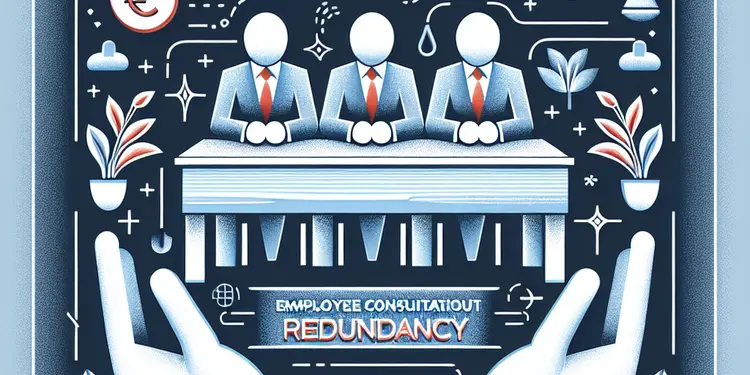
How should companies consult employees about redundancy?
Relevance: 72%
-

Redundancy Crusader and Annabel Kaye on making redundancy a better experience (2).MTS
Relevance: 71%
-

What is the primary purpose of redundancy?
Relevance: 70%
-

What are the legal requirements for redundancy in the UK?
Relevance: 70%
-

What is the primary purpose of redundancy?
Relevance: 70%
-

How is redundancy pay calculated in the UK?
Relevance: 70%
-

Redundancy Coaching Couch 3: States
Relevance: 69%
-
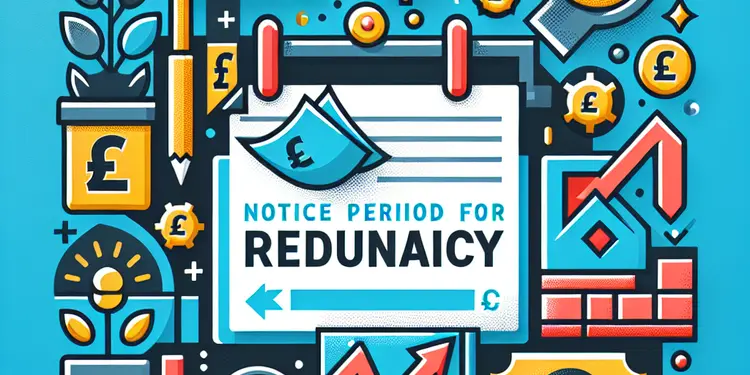
What is the notice period for redundancy?
Relevance: 69%
-

Is feedback allowed on the HMRC Employer Bulletin?
Relevance: 68%
-

What is redundancy pay and who is eligible for it?
Relevance: 68%
-

What is redundancy pay and who is eligible for it?
Relevance: 67%
-
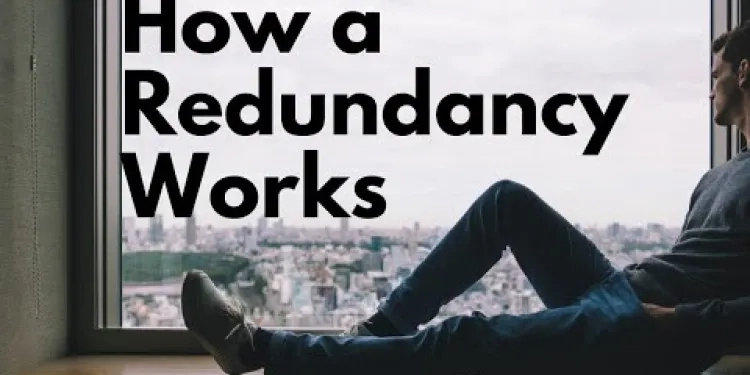
HOW A REDUNDANCY WORKS - General Information
Relevance: 67%
-
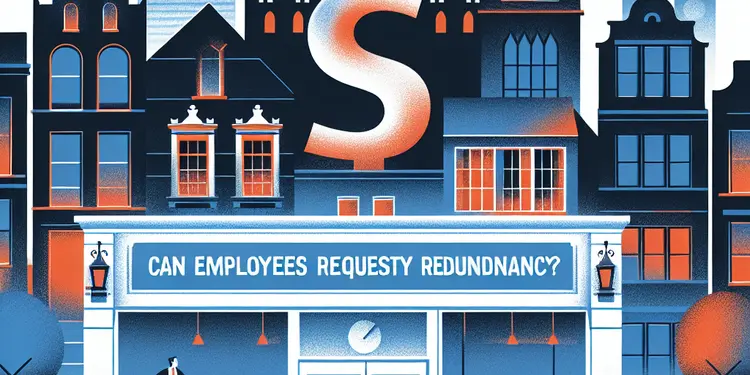
Can employees request voluntary redundancy?
Relevance: 67%
-

What is a fair selection process for redundancy?
Relevance: 67%
-

Can an employee appeal a redundancy decision?
Relevance: 66%
-

What support can employees expect during redundancy?
Relevance: 66%
-

What is the role of trade unions in the redundancy process?
Relevance: 65%
-
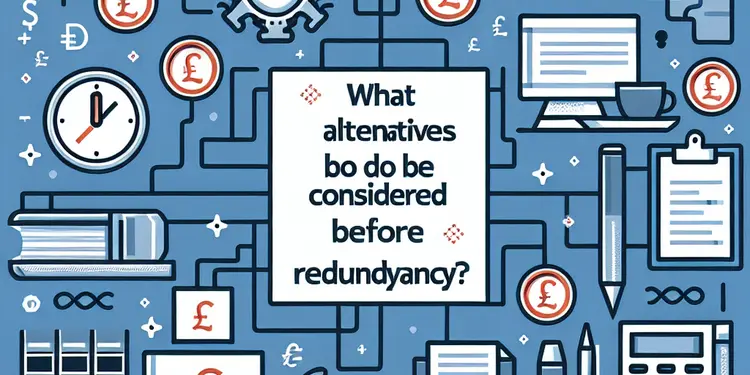
What alternatives should be considered before redundancy?
Relevance: 64%
-

Frequently asked questions about redundancy from ACAS
Relevance: 64%
-
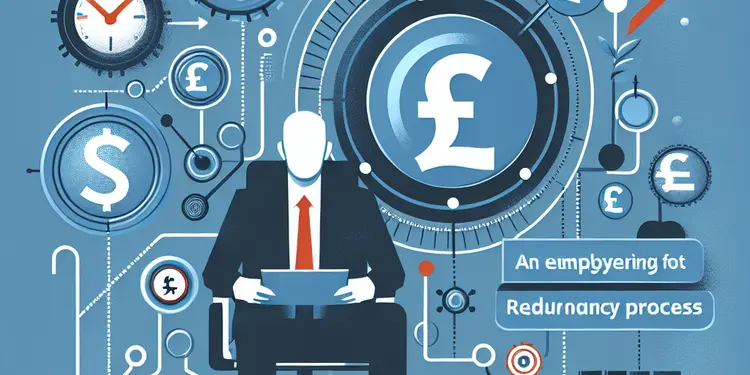
What happens if an employer does not follow the redundancy process?
Relevance: 63%
-

Are there any protections for employees on maternity leave during redundancy?
Relevance: 63%
-

How can parents provide feedback on school meals?
Relevance: 62%
-

How can I provide feedback about my NHS dental care?
Relevance: 61%
-

What feedback do customers give regarding banking fees?
Relevance: 54%
-

How is the quality of live-in care monitored?
Relevance: 25%
-

How is cortisol regulated in the body?
Relevance: 23%
-

How do community helpers stay updated on best practices?
Relevance: 21%
-

What role do consumers play in the recall process?
Relevance: 21%
-

Understanding Your Rights: Legal Support for Families During Economic Turbulence
Relevance: 21%
Why Feedback in the workplace is important in redundancy.
Feedback in the workplace is a fundamental aspect of professional growth and organizational development. It serves as a valuable tool for both employees and employers. Constructive feedback provides individuals with insights into their strengths and areas for improvement, fostering continuous learning. Timely and specific feedback enhances performance, allowing employees to align their efforts with organizational goals.
Additionally, a culture that encourages open and honest feedback promotes effective communication and teamwork. It builds trust among team members and helps in resolving conflicts constructively. Managers play a pivotal role in providing guidance, recognizing achievements, and addressing challenges. Conversely, employees should be open to receiving feedback, viewing it as an opportunity for personal and professional development. Ultimately, a feedback-rich environment contributes to a positive workplace culture, driving innovation, collaboration, and overall success.
Listening to feedback can be very helpful in identifying the strengths that will help you find your next role.
Redundancy Coaching Couch 5: Redundancy and Feedback
Understanding Redundancy
In the United Kingdom, redundancy refers to the dismissal of employees when their roles are no longer necessary. This can happen due to various reasons such as company restructures, technological changes, or economic downturns. Redundancy is a stressful experience; hence, it's crucial to handle the situation with sensitivity and support.
The Importance of Feedback during Redundancy
Feedback, especially in the context of redundancy, serves multiple purposes. Constructive feedback helps in personal development, guiding the affected employees towards future opportunities and roles. It can boost their confidence and provide clarity on their strengths and areas for improvement.
Providing Effective Feedback
Feedback during redundancy must be structured, empathetic, and constructive. It is not just about pointing out weaknesses; it is about offering guidance for future employment. Here are a few tips for providing effective feedback:
- Be Honest but Compassionate: Clearly communicate the reasons behind the redundancy, ensuring that the employees understand it is not a reflection on their capabilities.
- Focus on Strengths: Highlight the strengths and achievements of the employees, encouraging them to leverage these in their job search.
- Offer Practical Advice: Provide advice on improving CVs, enhancing interview skills, and developing professional networks.
Support Systems for Redundant Employees
Support systems play a crucial role in helping redundant employees transition smoothly. Outplacement services, career counseling, and training programs are some avenues that can assist in developing new skills and securing new employment. Employers are encouraged to provide access to these resources to mitigate the impact of redundancy.
Legal Requirements and Fair Treatment
In the UK, employers must follow specific legal requirements when conducting redundancies. This includes providing adequate notice, offering redundancy pay, and ensuring fair selection criteria. Treating employees with respect and fairness during this process is paramount to upholding the company’s reputation and employee relations.
Mental Health and Well-being
The psychological impact of redundancy can be significant. Providing mental health support, such as access to counseling services, can make a considerable difference. Employers should promote a supportive environment where employees feel valued and heard, even during challenging times.
Conclusion
Redundancy and feedback are intertwined, serving as crucial elements in the transition process for affected employees. By offering empathetic, constructive feedback and robust support systems, employers can help their employees navigate redundancy with resilience and confidence.
Why Feedback at Work Matters During Redundancy
Feedback at work is very important. It helps people grow and learn. Feedback is good for both workers and bosses. It tells you what you are good at and what you need to get better at. This makes you learn all the time. When feedback is given quickly, it helps you do a better job. It also helps you work towards what the company wants.
When people share feedback openly, it makes talking and working together easier. It helps everyone trust each other and fix problems in a good way. Bosses need to guide their teams, say “well done” when things go right, and help solve problems. Workers should listen to feedback and use it to grow both personally and in their jobs. Good feedback makes work a happy place. It helps everyone to think of new ideas and work well together to succeed.
Listening to feedback is also helpful. It can show you what you are good at, which can help you when looking for a new job.
Redundancy Coaching Couch 5: Redundancy and Feedback
What is Redundancy?
In the United Kingdom, redundancy happens when someone loses their job because it is no longer needed. This can happen if a company changes, new technology comes in, or money is tight. Losing a job can be very difficult, so it's important to be kind and helpful.
Why Feedback is Important during Redundancy
Feedback means telling someone what they are good at and what they can do better. When someone loses their job, feedback can help them grow and find new work. It makes them feel good about themselves and shows what they can do.
How to Give Good Feedback
When a person loses their job, feedback should be clear, kind, and helpful. It's not just about saying what's wrong. It's about helping them find new work by:
- Being Honest and Kind: Explain why the job is ending. Make sure they know it’s not because they did a bad job.
- Talking About Strengths: Tell them what they are good at. This will help them when they look for new jobs.
- Giving Useful Tips: Help them write a better CV, practice for interviews, and make new work friends.
Helping People Who Lose Their Jobs
Help is very important if someone loses their job. Things like job advice, career talks, or learning new skills can help them find a new job. Employers should offer these to help people quickly move to new opportunities.
Rules and Fairness
In the UK, there are rules about how to end a job. Employers must warn people, pay redundancy money, and be fair in choosing who goes. It’s very important to be fair and respectful to keep a good company name and relationships.
Mental Health and Feeling Good
Losing a job can be very upsetting. It helps to talk to someone who can listen, like a counselor. Employers should make sure people feel supported and heard, even when times are tough.
Conclusion
When a job ends, feedback and help are very important. By being kind and helpful, employers can make it easier for people to find new jobs and stay strong and positive.
Frequently Asked Questions
What is redundancy?
Redundancy is a form of dismissal from your job, caused by your employer needing to reduce the workforce. This can happen due to various reasons such as budget cuts, restructuring of the company, or closure of the business.
What are my rights if I am made redundant?
You have several rights, including the right to a redundancy payment, a notice period, the option to move into a different role if available, and the right to consultation. You may also be eligible for time off to look for new work.
How is redundancy pay calculated?
Redundancy pay is usually based on your age, weekly pay, and the number of years you have worked for your employer. Statutory redundancy pay follows a specific formula, but some employers may offer enhanced redundancy packages.
What is the statutory notice period for redundancy?
You must be given a minimum notice period based on how long you have worked for your employer. For example, 1 week if you have been employed for 1 month to 2 years, and 1 week for every year employed if over 2 years, up to a maximum of 12 weeks.
Can I challenge a redundancy decision?
Yes, if you believe the redundancy is unfair, you can challenge it. You might want to seek legal advice or contact organisations such as ACAS for guidance.
What support is available during redundancy?
Support can include career coaching, outplacement services, and access to job search resources. Additionally, the Jobcentre Plus Rapid Response Service can provide practical help.
Can I be made redundant while on maternity leave?
Yes, but the reasons must be fair and your employer must follow proper procedures. You have additional protections and should be offered a suitable alternative position if available.
What feedback should I expect during the redundancy process?
You should receive clear communication and feedback from your employer regarding the reasons for redundancy, how it affects your role, and details about the redundancy process and any support available.
What should I do if I get made redundant?
Stay informed about your rights, seek legal advice if needed, update your CV, and start looking for new job opportunities. Use resources like career coaching and job search platforms to aid your transition.
How can I cope with the emotional impact of redundancy?
Acknowledge your feelings and seek support from friends, family, or professional counsellors. Keeping a positive mindset and focusing on future opportunities can also help.
What criteria should redundancy selection be based on?
Criteria can include skills, qualifications, work performance, and experience. Selection should not be based on discriminatory factors such as age, gender, disability, or race.
Am I entitled to paid time off to look for work?
If you have been continuously employed for at least 2 years, you are entitled to reasonable time off with pay during your notice period to look for another job or arrange training.
What is a collective redundancy?
Collective redundancy occurs when 20 or more employees are made redundant at one establishment within a 90-day period. Employers must follow additional consultation procedures in such cases.
How can redundancy affect my pension?
Redundancy might impact your pension contributions, particularly if you are part of a company pension scheme. You should receive information from your employer about how your pension will be affected.
Can I volunteer for redundancy?
Yes, some employers offer voluntary redundancy as an option. If you volunteer, you may receive a financial package that is usually at least the same as the statutory redundancy pay.
What is redundancy?
Redundancy means losing your job because there are too many workers and not enough work. It is not because you did something wrong.
Helpful Tips:
- Talk to someone if you feel upset.
- Look for help to find a new job.
- Make a list of what you are good at.
Redundancy is when you lose your job because your boss needs to have fewer workers. This can happen if the company needs to save money, changes how it works, or closes down.
What are my rights if I lose my job because it is not needed anymore?
If your job is not needed, it is called redundancy. Here is what you need to know:
- You should get a notice period. This is time to get ready to leave your job.
- You may get redundancy pay. This is money you get when your job is over.
- You can ask why your job is ending. This helps you understand the reason.
- You might get help finding a new job. Sometimes, your company can help you look for work.
- You can talk to someone if you are upset or confused. Friends, family, or a work helper can support you.
You have rights if you lose your job because it is not needed anymore. Make sure to ask questions and get help if you need it.
You have some important rights at work:
- You can get money if you lose your job.
- You should be told early if you might lose your job.
- If there is another job you can do, you should be told.
- You can talk to your boss about what is happening.
- You might be able to take some time off to find a new job.
It can help to ask someone you trust for advice.
How do you work out redundancy pay?
If you lose your job because it is no longer needed, you might get some money. This is called redundancy pay.
To work out how much you get:
1. Count how many full years you worked at the job.
2. Check how old you are.
3. Use the rules for calculating redundancy pay (ask an adult to help or use an online calculator).
Helpful tools:
- Ask an adult for help.
- Use an online calculator to make it easier.
- Write notes to keep track of what you find out.
Getting money when you lose your job is called redundancy pay. This money depends on three things: how old you are, how much you earn each week, and how many years you have worked for your boss.
There is a special way the government says to calculate this money, but some bosses might give you more.
What is the notice period if you lose your job?
How long will your boss tell you before you lose your job?
If your company lets you go, they must let you know before. The time they give you is called a "notice period."
Here are some tools to help you understand: - Break the information into small parts. - Use pictures or drawings to explain steps. - Ask a friend or family member to explain it to you.
You should get a notice period when you stop working. This depends on how long you have worked for your boss. If you have worked for 1 month to 2 years, you get 1 week of notice. If you worked for more than 2 years, you get 1 week for every year you worked. The most notice you can get is 12 weeks.
Tips and tools: Use a calendar to count the number of weeks. You can also ask someone you trust to help you understand these rules. If you have a phone or tablet, you can set reminders to keep track of important dates.
Can I ask for a change if I lose my job?
If you lose your job because of redundancy, you can ask for a change. This means you can say you do not agree. Here are some tips to help:
- Ask Why: Talk to your boss and ask why you are losing your job.
- Ask for Help: You can talk to a union or someone who knows about job laws.
- Write a Letter: You can write a letter to say you do not agree.
- Use Tools: There are websites and phone lines that can give advice.
Yes, if you think losing your job is not fair, you can say something about it. You might want to talk to a lawyer or get help from places like ACAS.
What help can you get if you lose your job?
If you lose your job, you can get help.
Here are some ways you can get help:
- Ask someone to help you write your CV. A CV is a list of your skills and jobs.
- Look for jobs online. You can use websites or apps.
- Talk to a job coach. They can give you advice.
- See if you can get money help. This is called benefits.
- Join groups that help people find jobs.
If you need help, ask someone you trust.
There are different ways to help people find a job. This help can include talking with a career coach, getting help when leaving a job, and using tools to look for a new job. The Jobcentre Plus Rapid Response Service can also give useful help.
Can I lose my job while on maternity leave?
Yes, your boss can move you, but it must be fair. They also need to follow the right steps. You have extra protection, and if there is another job that fits you, they should offer it to you.
What will people tell me during the redundancy process?
When you are going through redundancy, you will get some information and help. Here is what you can expect:
- Someone might talk to you and explain why the redundancy is happening.
- You should ask questions if anything is unclear. It's okay to ask and get help.
- You might have meetings with your boss or a manager. They will talk with you about your job.
- They may give you written information, like letters or emails, about what will happen next.
If you need more help, you can talk to a friend, family member, or a union representative. You can also use tools like a recorder to remember what people say, or a calendar to keep track of important dates.
Your boss should tell you clearly why your job is ending. They should explain how this affects your job, what will happen next, and if there is any help available for you.
What should I do if I lose my job?
If you lose your job, it's important to stay calm and take some steps to help yourself:
- Ask for help: Talk to family or friends who can support you.
- Check your money: Look at how much money you have saved. See if you can get any financial help.
- Make a plan: Think about what kind of job you want next. Write down steps to find a new job.
- Update your CV: Make sure your CV is up to date with all your latest skills and jobs.
- Learn new skills: Look for free classes or online courses to learn something new.
- Talk to others: Tell people you know that you are looking for a job. They might know of jobs for you.
Remember, it's okay to ask for help. You are not alone. You can talk to a counselor or job advisor for more support. They are there to help you.
Learn about what you can do, talk to a lawyer if you need help, make sure your CV is up to date, and start looking for new jobs. Get help from career coaches and use job websites to make finding a new job easier.
How can I feel better if I lose my job?
Losing your job can be tough. Here are some ways to help you feel better:
- Talk to friends and family. Sharing your feelings can help.
- Write about your feelings in a diary. This can make you feel lighter.
- Make a plan for the day. A routine can make things easier.
- Try to learn something new. This can keep your mind active.
- Ask for help if you need it. Talking to a counselor can be a good idea.
Remember, it's okay to feel sad or worried. Be kind to yourself.
It is important to know how you feel and talk about it. You can chat with friends, family, or a special helper like a counselor. Try to think good thoughts and look forward to new chances. This can make you feel better.
What things should be looked at when choosing who to let go from a job?
When choosing someone, think about what they can do, their training, how well they do their job, and what they have done before. Do not pick someone because of their age, if they are a boy or girl, if they have a disability, or the color of their skin.
To help read better, try using text-to-speech tools or apps that can read words out loud. You can also use highlighters to mark important words.
Can I get paid time off to find a new job?
If you have been working for the same place for 2 years or more, you can take some time off with pay to find a new job or get training. This happens during your notice period.
What is a collective redundancy?
When many people lose their jobs at the same time, we call it a "collective redundancy." It means a company needs fewer workers and has to let a lot of people go. It's like when a company says, "We don't need this many helpers anymore."
If you want help understanding this, you can talk to someone you trust. You can also use tools like drawing pictures or making lists to see how many workers are staying or leaving. These tools can help make the information clearer.
Collective redundancy happens when 20 or more workers lose their jobs at the same place in 90 days. Bosses have to talk to the workers and follow special rules when this happens.
How does losing my job affect my pension money?
When you lose a job, it's called redundancy. It might change how much money you get when you are older.
Here are some helpful tips:
- Talk to someone in your workplace or a money advisor.
- Look at your pension papers to see what they say.
- Use a calculator online to see how changes affect your money.
These steps can help you understand what happens to your future money if you lose your job.
If you lose your job because the company doesn't need you anymore, it might change how you save money for your pension. A pension is money you save now to use when you are older and don't work anymore. If your company helps you save money in a special plan, they will tell you how losing your job changes that.
Can I choose to leave my job and get money?
If you want to stop working and get money from your job, tell your boss. This is called "volunteering for redundancy." Here’s how you can do it:
- Ask your boss if you can choose to leave your job and get money.
- Your boss will tell you if it's okay to do this.
- It's important to check how much money you will get.
For extra help, you can:
- Talk to someone who knows a lot about jobs.
- Use easy online guides to understand more about leaving your job and getting money.
Yes, some bosses let people choose to leave their jobs. This is called voluntary redundancy. If you choose to leave, you might get some money. This money is often the same or more than the usual pay people get when they have to leave their job.
Useful Links
Have you found an error, or do you have a link or some information you would like to share? Please let us know using the form below.
-->
This website offers general information and is not a substitute for professional advice.
Always seek guidance from qualified professionals.
If you have any medical concerns or need urgent help, contact a healthcare professional or emergency services immediately.
Some of this content was generated with AI assistance. We’ve done our best to keep it accurate, helpful, and human-friendly.
- Ergsy carfully checks the information in the videos we provide here.
- Videos shown by Youtube after a video has completed, have NOT been reviewed by ERGSY.
- To view, click the arrow in centre of video.
- Most of the videos you find here will have subtitles and/or closed captions available.
- You may need to turn these on, and choose your preferred language.
- Go to the video you'd like to watch.
- If closed captions (CC) are available, settings will be visible on the bottom right of the video player.
- To turn on Captions, click settings .
- To turn off Captions, click settings again.
More Items From Ergsy search
-

Redundancy Coaching Couch 5: Redundancy and Feedback.MTS
Relevance: 100%
-

How should companies consult employees about redundancy?
Relevance: 78%
-

Redundancy Coaching Couch 7: Redundancy and Judgement.MTS
Relevance: 77%
-

Redundancy Coaching Couch 4:Redundancy and Language
Relevance: 77%
-

Redundancy Coaching Couch 1: Redundancy and Presuppositions
Relevance: 77%
-

Redundancy Coaching Couch 2: Redundancy and Passion
Relevance: 76%
-

How should employers manage the emotional impact of redundancy on employees?
Relevance: 75%
-

Redundancy Crusader and Annabel Kaye on communications in redundancy (5).MTS
Relevance: 74%
-

What are the legal requirements for redundancy in the UK?
Relevance: 73%
-

Redundancy Crusader and Annabel Kaye on scope and scale of redundancy (3).MTS
Relevance: 72%
-

Redundancy Crusader and Annabel Kaye on the Current Model of Redundancy (1).MTS
Relevance: 72%
-

How should companies consult employees about redundancy?
Relevance: 72%
-

Redundancy Crusader and Annabel Kaye on making redundancy a better experience (2).MTS
Relevance: 71%
-

What is the primary purpose of redundancy?
Relevance: 70%
-

What are the legal requirements for redundancy in the UK?
Relevance: 70%
-

What is the primary purpose of redundancy?
Relevance: 70%
-

How is redundancy pay calculated in the UK?
Relevance: 70%
-

Redundancy Coaching Couch 3: States
Relevance: 69%
-

What is the notice period for redundancy?
Relevance: 69%
-

Is feedback allowed on the HMRC Employer Bulletin?
Relevance: 68%
-

What is redundancy pay and who is eligible for it?
Relevance: 68%
-

What is redundancy pay and who is eligible for it?
Relevance: 67%
-

HOW A REDUNDANCY WORKS - General Information
Relevance: 67%
-

Can employees request voluntary redundancy?
Relevance: 67%
-

What is a fair selection process for redundancy?
Relevance: 67%
-

Can an employee appeal a redundancy decision?
Relevance: 66%
-

What support can employees expect during redundancy?
Relevance: 66%
-

What is the role of trade unions in the redundancy process?
Relevance: 65%
-

What alternatives should be considered before redundancy?
Relevance: 64%
-

Frequently asked questions about redundancy from ACAS
Relevance: 64%
-

What happens if an employer does not follow the redundancy process?
Relevance: 63%
-

Are there any protections for employees on maternity leave during redundancy?
Relevance: 63%
-

How can parents provide feedback on school meals?
Relevance: 62%
-

How can I provide feedback about my NHS dental care?
Relevance: 61%
-

What feedback do customers give regarding banking fees?
Relevance: 54%
-

How is the quality of live-in care monitored?
Relevance: 25%
-

How is cortisol regulated in the body?
Relevance: 23%
-

How do community helpers stay updated on best practices?
Relevance: 21%
-

What role do consumers play in the recall process?
Relevance: 21%
-

Understanding Your Rights: Legal Support for Families During Economic Turbulence
Relevance: 21%


